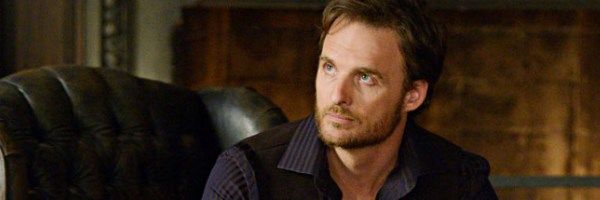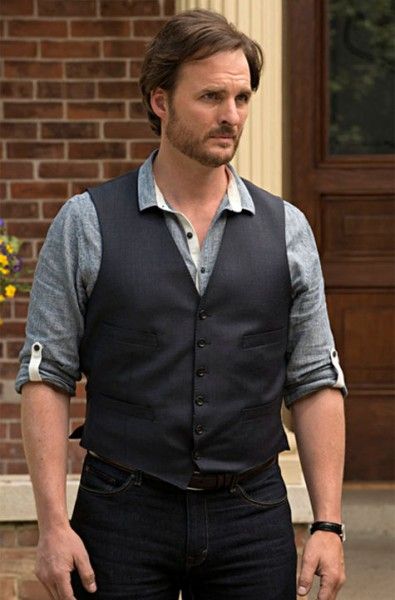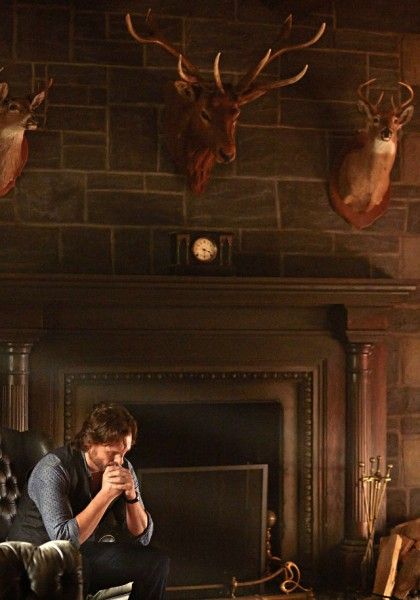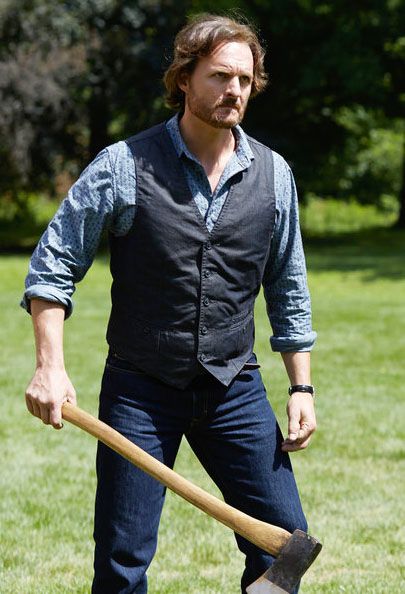The sci-fi drama series Bitten, based on the first of best-selling author Kelley Armstrong’s Women of the Otherworld novels, tells the story of lone female werewolf Elena Michaels (Laura Vandervoort), a woman desperate to escape a world she never wanted to be a part of. The betrayal of having been turned sent her running to try to lead a normal life away from her pack family, until she’s pressured to return to help track down a killer or killers that threaten to expose the secret existence of werewolves. The show also stars Greyston Holt, Greg Bryk, Steve Lund, Michael Xavier, Paulino Nunes and Paul Greene.
During this exclusive phone interview with Collider, actor Greg Bryk (who plays pack alpha Jeremy Danvers) talked about how he came to be a part of this show, the balance between staying true to the book while adding in things that are unexpected, why he chose to read the book ahead of time, how he approaches the layers of his character, what type of pack leader Jeremy is, which big finale reveal most surprised him, why Jeremy risks everything to tell Elena the truth, what it was like to shoot such an epic finale, and what he’d like to see explored in a potential Season 2. Check out what he had to say after the jump, and be aware that there are major spoilers, if you haven’t seen Season 1.
Collider: How did you come to this show?
GREG BRYK: When the breakdown for this character came out, it resonated with me and it was something that I pursued very aggressively. I had worked with one of the showrunners, Grant Rosenberg, on another series called XIII, and I reached out to them. I’m at a point in my life where I have three kids. I’m a father, and you start to take stock and measure yourself as a man and see where there’s room for growth. I was at a point in my life where I was working with this really amazing counselor. You look at your past and things that are unresolved and figure out what you need to do to move forward and fill a role with your family and in your community. So, that idea of being the alpha, the leader and the man was really at the forefront of my mind. And then, this role came along and it seemed like such a wonderful opportunity to explore myself and allow what I was learning about myself to echo back into the work.
For me, it was a real blessing. The other actors involved were such wonderful young actors and people that it was a real pleasure to take them under my wing. My wife and I would have them over for pack meals at the house. They’re talented and ambitious, and it was an honor to protect them and guide them through the process. Laura [Vandervoort] was starring in and carrying her first series, and she did that with such grace and elegance, and a fierceness and intelligence. And then, the boys are young men who are trying to figure out what being a man means to them. The material had a lot of human resonance for us. It’s a very heightened and fantastical world, but there’s such a strong heartbeat throughout the whole series. The relationships are real and the emotional stakes are high.
This show is cool because it’s found a nice balance of staying true to the book, as well as adding in things that are unexpected.
BRYK: There’s such a tremendous following for the books. It’s a very loyal base. And everybody likes familiarity. When you fall in love with something, you want it retold almost exactly. But the series is a slightly different animal. You have to think of them as lovers, as opposed to the same person. They inform each other, but it’s dangerous, new and unpredictable, kind of like life. If you trust that the people making the show love the source material and the characters, and it’s a different medium and there are different requirements for long-form storytelling that will hopefully carry over a number of seasons, then it’s exciting.
Because this show is both similar to and different from the book, did you want to read the book before doing this?
BRYK: I read Men of the Otherworld, which is a prequel that talks about Jeremy finding Clay and Jeremy’s relationship with his father and his grandfather who looked after him and the element of the mother. The character is really richly drawn. Kelley [Armstrong] is a wonderful author, and the worlds are well-populated. It’s an exciting world. Jeremy in the books, on his maternal side, is Asian. So, when I was approaching them, I thought it would be problematic for fans of the books because they have this expectation, and rightfully so, that there is this physical manifestation of the maternal side. Obviously, I couldn’t do that, but I could honor the sensitivity and the intelligence and those qualities that the character has was my approach to the character. So, I wanted to feed myself as much information as possible, ahead of time. You really have to be a character to serve it properly. Obviously, you’re acting, but you have to have those things in yourself, whether it’s the experience or the same qualities. Becoming Jeremy has made me such a better man, in my life. That, in turn, has fed back into creating a very strong, compelling character in the series.
Jeremy is an interesting character because he has a warmth to him, but he can also be very lethal when necessary. How did you approach that, in each scene, and find the right levels, as an actor?
BRYK: I don’t intellectualize that a whole bunch. In my own life, I boxed through college and I played college level football. I was a linebacker. I grew up with a very quick temper, and the language of violence is a language that I’m very familiar and comfortable with. I did the David Cronenberg film, A History of Violence, with Viggo Mortensen and I played a real sociopath. For the next seven years, and thank god because it provided for a family, I played the psycho-of-the-week. So, playing characters that speak a very violent language was my livelihood. I’m also the father of three beautiful children and I’ve been married to my wife for 18 years, and we’ve been together for 20 years, so I have a very tender side. I bake my daughter cupcakes for her school. I’ve been blessed that I’ve been very present in their lives and am there for all of their events. I’m very hands-on. I had a great mother, and I’m very comfortable with that maternal element. So for me, I just drew on those two parts of myself. I really had a strong affection for the actual cast members, so the emotional side, the tenderness and the paternal care for them seemed right and was real, and echoed into real life, as well. And the violence is the violence. I understand that we’re sometimes squeamish about it, but I think that strength needs to be called on once in awhile, and sometimes that’s the only thing that will work. For Jeremy, it’s more of a collaboration and a consensus, but at the same time, when he needs to become ruthless, that element is there.
Is Jeremy a reluctant leader, or is he secure and confident in his position?
BRYK: I think he’s an aware leader. Jeremy is supremely confident in his position in the pack. Once Antonio and the other members of the pack decided that Jeremy was their leader, he embraced that role in its totality. That’s why Jeremy does not have romantic interests. All of his energy and all of his power and all of his life force needs to be governed and channeled into leading this pack and keeping them safe. So, he is conscientious about how he adjudicates his power, but the confidence is absolute. It depends on the circumstances. He’s intelligent enough to think about things, but at the core, there’s confidence, not doubt.
The season finale has three big reveals, as far as why Clay really bit Elena, who’s really behind the attempted overthrow of the pack, and a surprising character death. Which one most surprised you when you read that script?
BRYK: I knew that Jeremy’s father was going to be involved, and I looked forward to that moment where we would finally meet. But the head on the pillow, I didn’t expect. It really is a shocking image and moment. This show doesn’t pull punches, at all. It’s not safe. It really pushes the emotional boundaries and tries to create something exciting and dangerous and unpredictable, and not just to be clever, but so that it really puts people in peril. A lot of shows will do things just to try to outguess an audience, but this was a much more organic process. It’s a very violent world. It’s a mutt uprising, but if you look at it as an echo to terrorism, the world is a dangerous, unstable place and sometimes there are casualties and struggles for power.
Why do you think Jeremy decided to risk everything by telling Elena the truth about why Clay bit her?
BRYK: Jeremy loves them both. To allow the pack to function as it was, Clay was willing to carry that cross. And I just think that, at the end of the day, you needed the catharsis of revelation. She could hate him forever, which is a very real and terrifying possibility. As a father, I have one daughter and two sons, and that relationship parallels with Jeremy’s relationship with Elena. The thought of losing her was really upsetting. But the idea that Jeremy let Clay protect him and suffer for his sins was something that, as a man and as a leader, he couldn’t abide by anymore. He had to tell her. He had to set them both free from that secret.
What was it like to film the finale episode, which is almost an episode-long fight?
BRYK: It was crazy. T.J. Scott came in and directed, and I was lucky enough to work with him on a movie called Deadliest Sea, a few years ago. He is dynamic. He’s a fantastic director, both for actors and action stuff. He did a lot of Spartacus. The difficult thing about shooting a television series like this is that you never have enough time. You really don’t. And this was a very ambitious episode. Fights take a long time to shoot, and then there was all the other stuff happening. But he comes in with a plan, he knows exactly what he needs to get, and he gets that, but also gives you enough room to find moments, as an actor. If you give a scene enough room to breathe, actors will hopefully find those magical moments. He was the perfect guy to shoot that episode because it was a humongous episode. And that ending is crazy because you think everything is done. That moment is just incredible.
If this show does get a second season, have you thought about the things you’re most interested to learn about your character, or that you’d like to see happen?
BRYK: Yeah, I’m very interested to look at the dynamic with Jeremy and his father. That’s one of those archetypal struggles that all men deal with. I would like to explore the relationship with all of the pack members and still navigating them through whatever struggles they have. Clay and Elena will have a very interesting dynamic. The first season is that dating choice of, do I pick this or do I pick that. And then, once you choose, or once your boyfriend’s head gets cut off, how do you find happiness? Once you’ve made a choice, how do you still find variety and happiness in that? How do you fight the stagnation of monogamy and the monotony of time together? And then, how do you realize yourself most fully, as a person? Within the stability of a family struggle, when there’s less chaos, you can have the most soul-searching and the most digging to find out what and who you really are. I think Elena’s journey is going to be really interesting. And there’s a baby coming with Logan. Maybe Jeremy will break his own rule and fall in love. There’s so much stuff happening. And I think there will be a lot more action. The mutts are definitely not out of play. The war is on, and it’s not something that’s just going to end quickly. I think that that battle will continue. Realistically, there are probably four or five good seasons of material, following the spine of Elena’s growth, but also where the other characters can go. There’s enough material there to keep people interested and to keep the stories vital, exciting, dangerous and real, before it loses its momentum.




